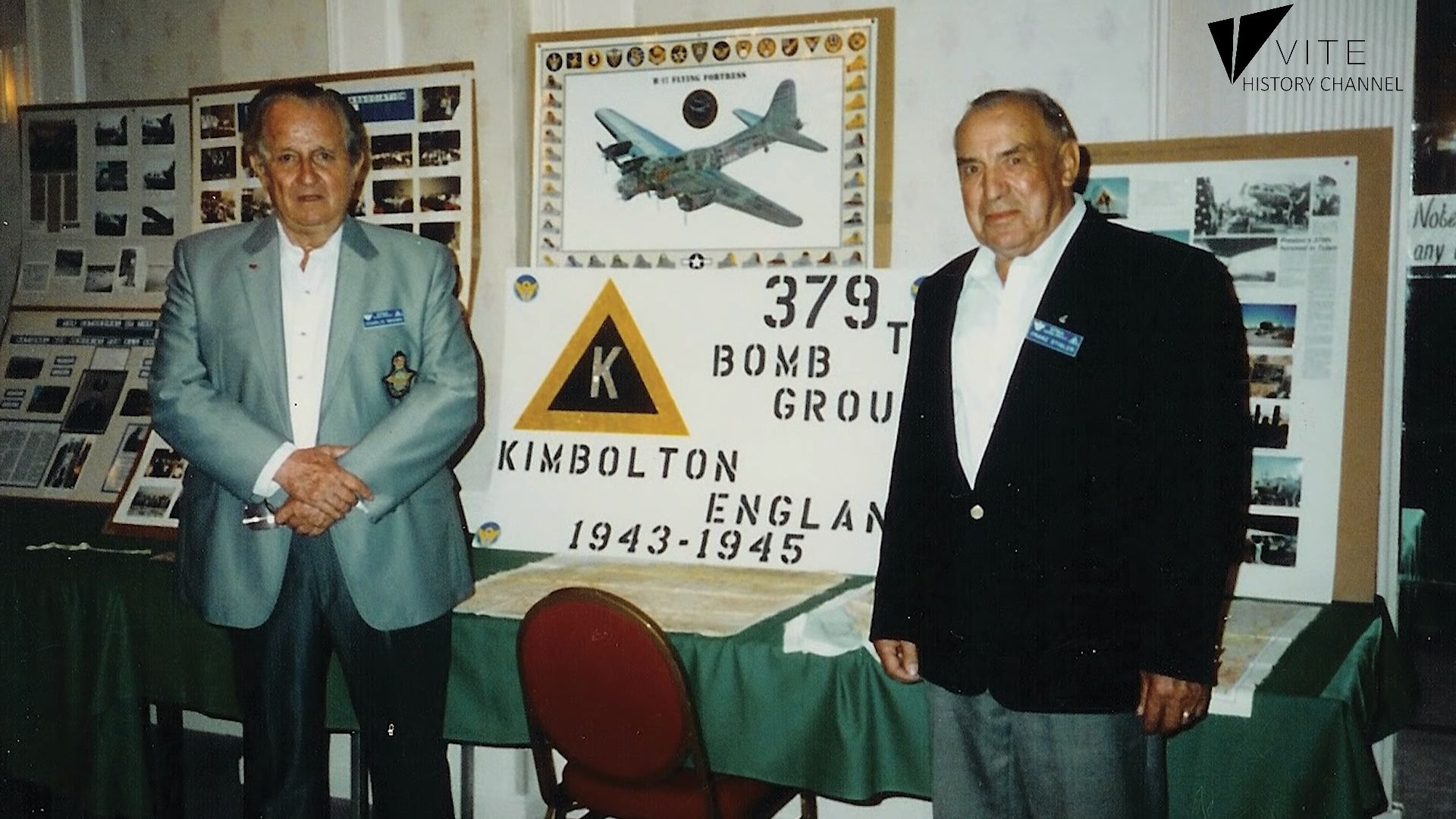 (From Military Aviation History)
(From Military Aviation History)
On December 20, 1943 an American B-17 pilot, Charlie Brown, a 21-year old from West Virginia, was on his first mission, part of a 500 bomber raid on Bremen, Germany. This was during the period before long-range fighters were available to escort bombers all the way to their targets, leaving the B-17 "Flying Fortress" formations vulnerable to German fighters who took a heavy toll on the American bombers (see A Falling Of Fortresses: The Schweinfurt Raids for more details).
Brown's plane, Ye Olde Pub, dropped its payload over target, but after being severely damaged by anti-aircraft fire on the approach run, was then set upon by a dozen German fighters, wounding several of the crew, and killing the tail gunner. Charlie was losing control, ending up inverted at one point, before managing to stabilize the plane at an altitude of less than 2,000 feet. Left behind by the rest of the returning American bombers, Brown would have to get Ye Olde Pub home by itself, crossing Germany and the Netherlands before reaching the relative safety of the North Sea.
It was at that point that German air ace Franz Stigler, with 29 enemy aircraft shot down to his credit, appeared behind Ye Olde Pub in his Me-109, and prepared to deal the fatal blow to the B-17. Seeing the tail gunner laying in a pool of blood, the severe damage to the plane (of the four engines, one was completely destroyed and two others damaged, part of the nose cone and most of the rudder gone - not visible to Stigler, the oxygen, hydraulic and electrical systems were also damaged), and realizing most of the B-17's guns were inoperable, he hesitated, finally deciding he could not fire on the crippled plane. He then pulled up next to the cockpit and signaled Brown. For the next few minutes, until Ye Olde Pub reached the North Sea, Stigler flew next to the low-flying B-17 to discourage anti-aircraft fire and other German fighters from attacking. Over the North Sea, Stigler waved goodbye to Brown and then returned to Germany.
Brown managed to make it back to England. He was debriefed by intelligence officers to whom he told the unbelievable story of the Me-109 pilot who saved them. After reporting up the chain, the officers came back to Brown and told him to tell his story to no one - they did not want word of a humane German act getting out. For his part, Stigler told no one because he would face a court-martial and severe punishment.
Charlie Brown flew 26 more missions during the war (of the ten man crew of Ye Olde Pub only Brown and 3 others survived flying the required number of missions) and then stayed in the Air Force until 1965. He never told anyone the story until 1985 when he mentioned it at a reunion of his bomber wing. That prompted him to wonder what happened to the German pilot and he began a search. In 1989 Franz Stigler came across one of Brown's messages in a German magazine for Luftwaffe veterans. Stigler left Germany in 1953, settling in British Columbia, and often wondered if the B-17 crew made it back to England.
In 1990, Brown and Stigler met for the first time and became good friends, in frequent contact and meeting at least once a year until they both died, months apart, in 2008.
These two videos tell their remarkable story:
An extraordinary code of honour
The Franz Stigler and Charlie Brown incident
The tale is also told in great detail in Adam Makos' excellent account, A Higher Call.
(Charlie Brown, left; Franz Stigler, right) The story of Brown and Stigler also raises interesting questions of how we remember people and exploits and how that remembrance depends on who does the remembering. Brown and Stigler attended reunions in America and Britain, telling their stories to veterans. As you'll see watching the videos, Charlie Brown's bomber wing gave Stigler an award in recognition of his act of chivalry. Yet Franz Stigler flew on behalf of one of the worst regimes in history and killed other British and American aviators while doing so. In one of the videos linked above they both reflect on this.
The story of Brown and Stigler also raises interesting questions of how we remember people and exploits and how that remembrance depends on who does the remembering. Brown and Stigler attended reunions in America and Britain, telling their stories to veterans. As you'll see watching the videos, Charlie Brown's bomber wing gave Stigler an award in recognition of his act of chivalry. Yet Franz Stigler flew on behalf of one of the worst regimes in history and killed other British and American aviators while doing so. In one of the videos linked above they both reflect on this.
No comments:
Post a Comment